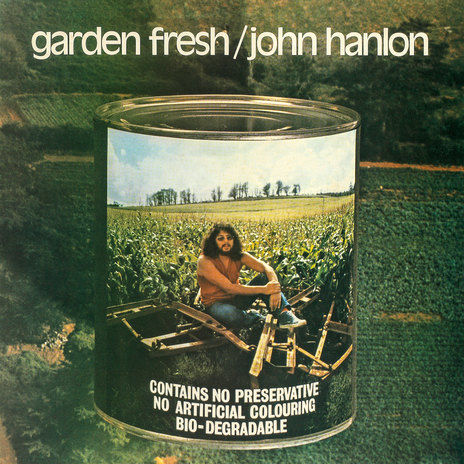
Garden Fresh, John Hanlon's 1974 Family label album that featured his breakthrough hit 'Damn The Dam'.
Pye’s quirky Family Label only lasted five years, from 1972 to 1976, but it made a substantial mark both artistically and commercially. It was home to John Hanlon, Butler, The Human Instinct, Shane, Ray Columbus and Eliza Keil. The first four probably created the label’s defining records, and Hanlon contributed its biggest-selling and best-remembered local catalogue. Family also broke ABBA into the New Zealand market, giving the quartet its first No.1.
Despite that, in the 45 years since the label shut down, almost none of its not-insubstantial New Zealand catalogue has been available, with John Hanlon’s albums being the only exception. This was addressed in 2021 when the current owner made almost all of it available online, reissuing all the missing albums and creating two compilations of the literally dozens of stray singles.
The Allied International/Pye group of companies entered the 1970s with a confusing plethora of record labels for their many local releases. There was the Allied International label itself, which had evolved in 1970s into an initialised variant, AIR (its claim to New Zealand music history being The Human Instinct’s classic 1970 album Stoned Guitar). Other labels included Pye, which looked like a relic from the early 1960s (it was: for some reason Pye NZ hadn’t graphically updated the label since then, unlike the UK parent). RCA, a licensed US label since 1955, was used by the New Zealand company for some of its own recordings, possibly without permission. MCA, was another licensed US label that, again, Pye used for its local releases, probably without asking.
A changing of the guard at Allied took place in 1970 with the retirement of George Wooller, the authoritarian patriarch who had created the New Zealand Pye Group in 1951 as the local licensee of the famous UK company. He then merged his own GA Wooller & Co. Ltd. business into that and ruled the resulting company as a fiefdom over the next decade and a half, a period which saw the company grow into the third biggest record company in the country, behind HMV and Philips, with the record division operating variously as both Pye and Allied International Ltd.
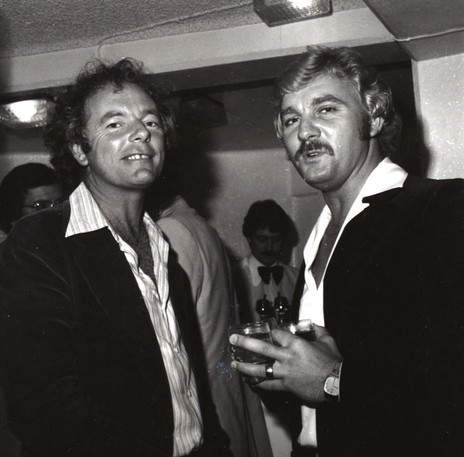
Tim Murdoch and Mike Harvey at the 1978 APRA Silver Scroll awards.
However, by the end of the 1960s, the company had lost its mojo as the rock explosion changed the face of the global music industry. Wooller, aware that the company needed to update, deftly headhunted an aggressive young executive from the advertising industry, Tim Murdoch. A friend of the Wooller family, Murdoch had an adventurous history in film and photography and had formed his own PR/advertising company in 1969, a company that was working with Pye as a client. Shortly before Wooller retired he offered Murdoch the job running the record division in 1970. Murdoch accepted, thus beginning the long record career of one of the New Zealand industry’s transformative figures.
TIM Murdoch decided the company should have a hip new brand.
Aware that Allied/Pye needed a kick start, Murdoch decided the company should have a hip new brand. He was possibly inspired by the way many of the UK companies had created cool labels at the time: EMI had Harvest, Decca had Deram, Phonogram had Vertigo, Pye UK had Dawn, and RCA’s UK branch had Neon, all targeted at the sharper end of the youth market. It was decided that Pye in New Zealand would have Brother, although from the start its A&R net was cast to a wider audience than the UK labels.
However, there was a problem: The Beach Boys had a label of the same name, thus, before any records were released on Brother (NZ), it was renamed to Family Label. In 1975 this was shortened to Family, although the copyrights always said Family Records. There was a similar issue with Family: again, a US label had a similar name, Family Productions. Although none of its dozen albums had done much, the US Family had an aspiring singer-pianist-writer on the roster called Billy Joel with one album, Cold Spring Harbour.
Tim Murdoch hired Rhys Walker, then at Festival Records, to be Pye’s label manager and run local A&R for the company, and Family was added to his roster. Walker, a co-founder of the boutique Auckland record shop Taste in Lorne Street was both attuned to what was happening internationally and part of the Auckland music scene.
“I knew Tim peripherally through Taste, so he knew who I was, and he was thick as thieves with Marlene [Short, the former manager of Lewis Eady’s record department].” Walker worked part-time with Short at Eady’s in the late 60s, and she went on to join Pye as a sales rep. “Marl persuaded Tim to hire me to replace John [Kerr, who had been fired by Pye] and that’s how I got the job.”
Walker played Murdoch the track on the Billy Joel album called ‘She’s Got a Way’ which he thought could be a hit, and suggested they try to license it. Murdoch didn’t like it but decided he liked the label name enough to use it. Besides, there were no Beach Boys on the US Family Productions, so it was risk free.
The origin of Family’s label logo, throughout its lifespan, is something of a mystery. It looks as if it was designed by an advertising agency and clearly borrowed shamelessly from the Brother logo. Perhaps it was, given Murdoch’s history in that industry.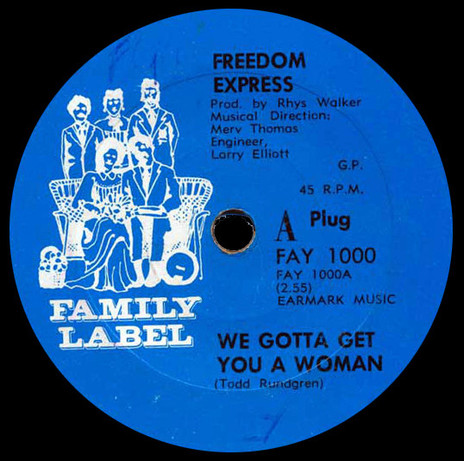
Freedom Express - We Gotta Get You A Woman (Family, 1972)
Family’s debut single, issued in January 1972, was by Auckland club band Freedom Express, who Walker moved from RCA. Their only single on RCA was ‘Freedom Blues’ b/w ‘Troubles’, produced by Walker and released in mid-1971. Freedom Express’s Family single was a great funky cover of the 1970 Todd Rundgren single ‘We Gotta Get You A Woman’, again produced by Walker. It was another regional hit, filling the Hauraki airwaves that summer.
Walker suggested they sign Freedom Express to a long-term deal, as their keyboardist, Paul Hewson, showed great promise. “He clearly had talent and, boy, could he play. He came down to see me with a couple of cassettes of songs he had written. Freedom Express’s drummer Mike Fisher came with him. Paul was introverted to the extreme – to the point of being monosyllabic. He avoided eye contact and relied on Mike, who had no such lack of confidence, to do the talking for him.
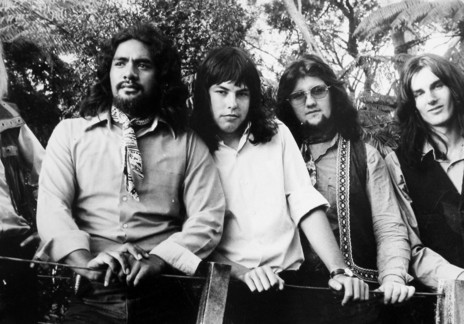
Freedom Express, 1971. Left to right: Rangi Williams, Noddy Dawson, Dennis Ryan, Paul Hewson. Rob Maginley has been cropped out on the left. - Simon Grigg collection
“A couple of Paul’s songs were very commercial in my opinion. Tim [Murdoch] was hungry to get into publishing and I wanted Tim to meet Paul. From memory, I hired one of the piano studios that used to be on the floors above the Lewis Eady store and brought Tim along to hear Paul play. It didn’t go well. Paul kept his head down the whole time but played and sang well. He was in his element. However, he was totally intimidated by Tim’s forthright manner and wouldn’t have uttered more than a couple of words to him after and wouldn’t look at him.
“In short, Tim liked the songs but told me ‘That guy’s out to lunch’ and that was that.” Within a few years Hewson had joined and was writing for Dragon.
Tim Murdoch not only intended the Family label to be a home for local artists but decided to expand the Allied international catalogue with aggressive licensing, thus the first two albums on the label came from deals done with US production houses. Mason Proffit’s folk-rock Movin' Toward Happiness, licensed from Happy Tiger Records (part of the Flying Tiger airline group!) didn’t exactly set sales records, however Mountain’s Nantucket Sleighride, from the Windfall Records label, could be found in countless New Zealand collections and was a party staple for much of the 70s. A second Mountain album, Live: The Road Goes Ever On, and a best of, followed.
Murdoch knew that Allied/Pye, as primarily a catalogue licensor, was vulnerable and was keen to increase its international roster.
Rhys Walker recalls, “Tim was always ‘label hungry’ … he was annoyed that when [Neil] Bogart took over the Buddah/Kama Sutra labels, he did not follow through on an alleged undertaking to licence the labels to Pye. The Lovin’ Spoonful had been a considerable money-maker for Pye previously and they were lost. He was also pissed that [US exec] Lou Adler had sold Dunhill to Jay Lasker at ABC, thereby taking the Mamas and the Papas to HMV/EMI.
“Tim was also dead keen to try to get the Elektra label off Viking and pursued Nesuhi Ertegun to that end. Of course, it came to nothing because Atlantic and Elektra were shortly absorbed into the WEA conglomerate.”
Family gathered together an eclectic roster and catalogue.
Family (and Allied/Pye) were also hamstrung by the lack of ready funds to license high profile artists or acts, lacking an Australian parent with deep pockets. “Tim wanted more big sellers. Part of my job was to help him achieve this, but we had little clout. Pye had paltry sums to offer overseas labels when it came to bidding for label rights. I think this was mostly because we had no single Australian ‘parent’ (with cash to spend) to support us, unlike the other companies here. So, it was easy for Australian companies to simply bid for and secure licences for ‘Australasia’, thereby shutting down any bids we made.”
That meant that Pye had to be both adventurous and aggressive in its licensing, and Family gathered together an eclectic roster and catalogue.
Over the next four years, Family released well over 100 singles, around 25 LPs and at least one EP. Its licensed catalogue ranged from the quirky and novelty (the second single, the Johann Sebastian Bach-inspired ‘Joy’ by UK group Apollo 100, licensed from the British Young Blood International label, was a major hit). Also, pop (Australian band Python Lee Jackson’s Rod Stewart-voiced hit ‘In A Broken Dream’), rock (Daddy Cool, more Australians best known for ‘Eagle Rock’, a song not on their Family album), and funk (Cymande’s UK funk classic LP Promised Heights).
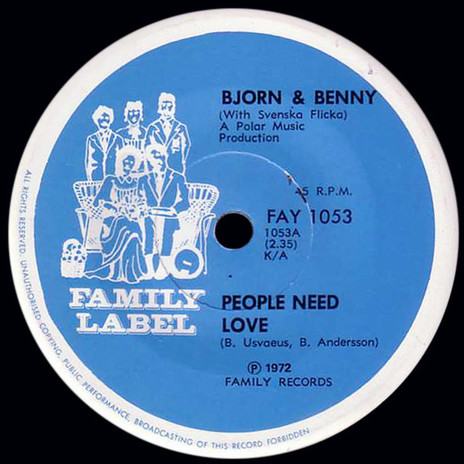
Bjorn & Benny - People Need Love / Merry-Go-Round 7" Single (Family, 1972)
Of interest to collectors worldwide now are seven singles and one album issued under licence from the Swedish Polar label. The first three singles were by Bjorn & Benny, before the name ABBA started appearing on the records. ‘Ring Ring’ was a No.17 hit in 1974 and was followed by ‘So Long’ (No.8) ‘Waterloo’ (No.3) and ‘I Do, I Do, I Do, I Do, I Do’ (No.1) before the band moved to RCA.
However, the local releases are of most interest. Of the 45s around 70 were by local acts, with a reasonable number of those being standalone, non-album, singles of varying quality. Two were by the Rhys Walker managed (until he moved to Melbourne in 1972) Cruise Lane, the great Auckland club band. The first of these, released in 1972, ‘Death Is In The Air’ b/w ‘Ego’, only featured the full band on side two, with the A-side being a solo track from their vocalist Kaye Wolfgramm, and it was followed by ‘We All Have To Find Our Own Way Home’ a year later, featuring Josie Rika, Lou Rawnsley and Dave Stewart. ‘Ego’ was a wonderful semi-prog epic, with terrific vocals from Al Hunter. Josie would turn up a year later with Rainbow, another Auckland club band, also featuring future Hello Sailor drummer Ricky Ball and bassist Paul Woolright. Their single ‘Doctor Rock And Roll’, produced by Murray Grindlay, was a song by US writer Gary St Clair, covered by The Righteous Brothers and Blue Swede.
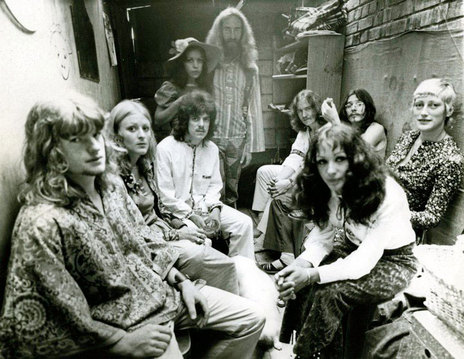
Cruise Lane and backing choir in the band room at the Embers, 1972. Left to right, Paul Lee, Shirley Hunter, Claude Radics, Kaye Wolfgramm, Peter Kershaw, Tony Pilcher, Josie Rika (front), Al Hunter, Pauline. - Peter Kershaw collection
There were notable singles by future Dragon vocalist Marc (as Mark) Hunter (a rollicking ‘X-Ray Creature’), Mike Harvey’s Salty Dogg, Larry Killip’s band, Starbow (a short lived pub-rock band that included Neil Edwards), two from Roger Skinner & The Motivation, a Ray Woolf single (‘Claudia’), the revivalist 1953 Memorial Society Rock’n’Roll Band (‘Tallahassee Lassie’), produced by Barry Coburn and fronted by Robbie Lavën who also had a single as part of the Red Hot Peppers. Their 1976 ‘Dreams To Come’ was one of the last singles on the label; the album it was taken from, Toujours Yours, appeared on the – newly independent of Pye – RCA label later that same year.
The final single by The Human Instinct, the Martin Hope-penned ‘Tropical Paradise’, recorded at the new Mandrill Studio in Parnell, was released in November 1975. A live favourite, the lineup for the fine country rocker was Hope on vocals and guitar, bassist Peter Cuddihy and drummer-bandleader Maurice Greer.
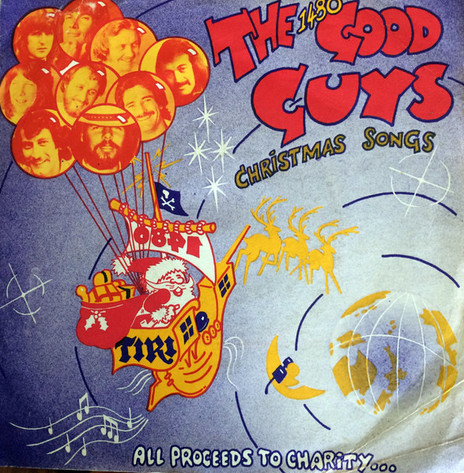
The 1480 Good Guys with Salty Dogg - Please Daddy Don't Get Drunk This Christmas 7" single (Family, 1975)
The Radio Hauraki Good Guys had a yule hit with the Salty Dogg backed ‘Please Daddy Don't Get Drunk This Christmas’ in 1975, singer-songwriter Wayne Roland Brown’s only Family record was ‘The Hallelujah Song’ in 1975 and Brendan Dugan & Gray Bartlett’s ‘Ballad Of Robbie Muldoon’, championing the National Party leader, was a No.4 single the same year. The conservative duo followed it with a pro-tour ‘All Blacks Song’ the next year which failed to chart. It was the final single on Family.
There were obscurities. Investigation has failed to discover who Michael was (no surname) but his single ‘A Little Piece At A Time’ from 1972 must have sold reasonably well as it turns up often in second-hand bins and online, and was followed by ‘Love Me, Love Me’ the next year. Less common is Diana and the Yugo Quartet’s EP Yugoslav Vocals which oddly features Ray Gunter, a common name in Auckland rock’n’roll and post-war jazz as a guitarist with credits on Tanza and Kiwi, plus Gene Blazer, bassist with Bob Paris’ and Johnny Devlin’s late 50s bands. Edson and Coles were two amateur singers from Takapuna who won a talent competition. The prize was a recording session with Shade Smith (formerly of The Rumour), released in 1974 as ‘My Castle In Spain’ b/w ‘Like The Birds In The Trees’, with Smith writing, producing and arranging both sides.
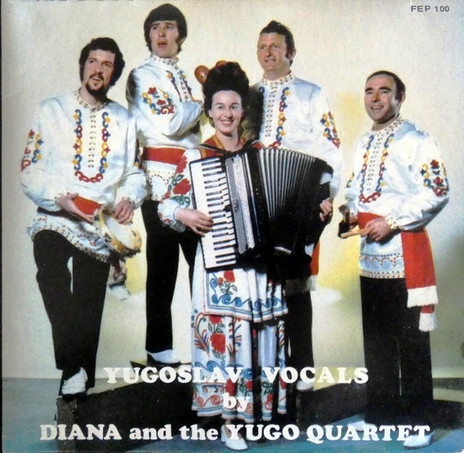
Diana and the Yugo Quartet - Yugoslav Vocals EP (Family)
Denny Cook was originally from England, emigrating to New Zealand, home of his girlfriend. Upset by French nuclear testing in the Pacific, he wrote ‘Hey Hey Mr Pompidou’ within a few days of arriving in New Zealand, recording it at Stebbing’s with Bernie Allen producing. The New Zealand frigate monitoring the tests at Mururoa blasted the song at full volume repeatedly, to annoy the French on the atoll. A documentary about this was made and has been shown several times. Cook still lives in New Zealand, performing under the name of Denny Pompey Cook.
Historically, it’s the album artists that now get the most attention, and while the label didn’t release the same quantity of local albums as it did singles, what it did release was often good, sometimes verging on great.
Eliza Keil’s Your Songs was recorded at Stebbing by the prolific Auckland composer and producer Tony Baker (his name is credited on many Family labels for both), seemingly for MCA in the US although there is no evidence it was ever released by the multi-national. In New Zealand it was the first local artist album issued by the new label.
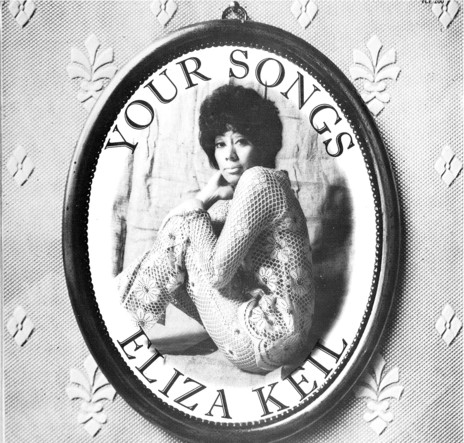
Eliza Keil's 1972 album Your Songs, on the Family label. - RNZ collection
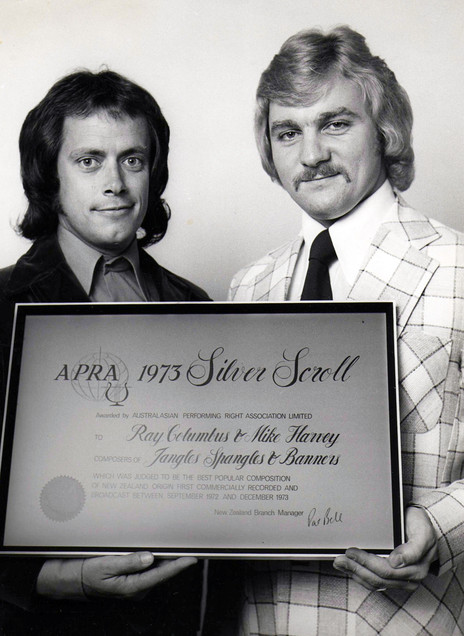
Ray Columbus and Mike Harvey, winners of the 1973 APRA Silver Scroll for their song 'Jangles, Spangles & Banners'.
Ray Columbus was the second local album artist, transferring from RCA to Family. While his 1972 album Jangles, Spangles & Banners may not be a career high point, it sold reasonably well. So did the singles from it, ‘Missing You’ and ‘Tell Me Do You’ (a duet with Jillian Richards), in part because of Ray’s public profile and oft-noted self-belief. There were two 1973 standalone singles from Ray as well, ‘Computer Dater’, and the oft-recorded skiffle favourite ‘Singing The Blues’, backed with a decent take of ‘Summertime Blues’ (although it never posed much of a threat to either Eddie Cochran or The Who’s genre-bending cover). ‘Summertime Blues’ was the single from a 1974 Columbus compilation Best Of Ray on Family; this also included three Zodiac era Invaders tracks, plus tunes from his Impact, Polydor and RCA years. Written by Ray Columbus and Mike Harvey, the song ‘Jangles, Spangles & Banners’ won the APRA Silver Scroll in 1973.
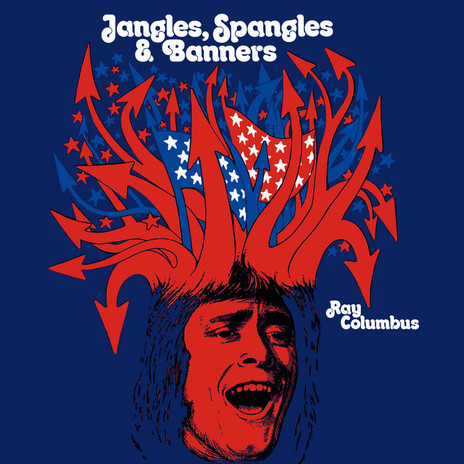
Ray Columbus - Jangles, Spangles and Banners (Family, 1972)
Shane Hales recorded Fire Exit, his last New Zealand album before he headed off to the UK, with a band which included Jimmy Hill, Billy Kristian, Mike Walker, Ricky Ball and Bruce “Phantom” Robinson (who also co-produced it). Released in 1973, supported by the single ‘Bad Weather’, Fire Exit is an underrated album: not least by the artist who has said he doesn’t like it. The album continued the singer-songwriter style that saw him dropped by HMV, two years earlier, after Straight Straight Straight. HMV wanted pop records to continue Shane’s hits in the late-60s.
All-Māori rock band Butler, from Rotorua via Christchurch, was signed to Family after playing at the Great Ngāruawāhia Festival, recording its self-titled album at Stebbing’s in June 1973. A psychedelic blues-rock classic that now goes for hundreds of dollars to collectors, at the time Pye didn’t quite know what to do with it, delaying it until late 1974 after the flop of the band’s first release: a fabulous but poorly chosen (it was deemed safe) single covering Creedence Clearwater Revival’s ‘Green River’. Sadly, by the time it was released the band had moved on and this landmark album also flopped.
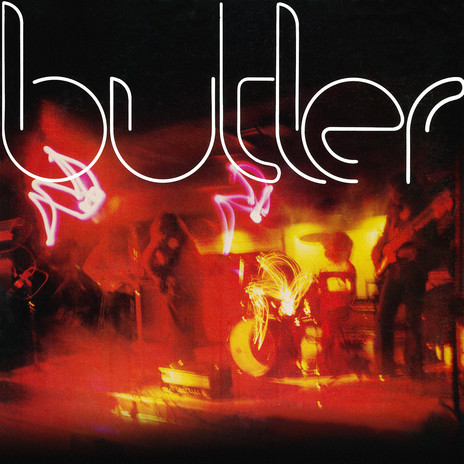
Butler (Family, 1973)
However, if any artist is linked to Family, it must be the quintessential (and very popular) 70s singer-songwriter John Hanlon. The Malaysian-born New Zealander was suggested to Tim Murdoch by Bruce Barton, owner of Mascot Studios in Eden Terrace. Barton had recorded over three dozen of Hanlon’s songs as demos there and Murdoch offered him a three-album deal (he was one of only two artists so contracted by Pye, the other was The Human Instinct). Hanlon’s debut album Floating, recorded at Stebbing’s in early 1973 and produced by Mike Harvey, may have been well reviewed but initially did little commercially. However the release of his second single later that year turned the shy musician into a household name. ‘Damn The Dam’ was originally written for a Pink Batts advert but was soon adopted as an environmental anthem by the Save The Manapouri campaign. It dominated the nation’s airwaves for months, and was the beginning of a string of hits, industry awards and three further albums, Garden Fresh, Higher Trails and Use Your Eyes that still resonate some five decades on. Songs such as ‘Lovely Lady’, ‘I Care’, ‘Knowing’ and ‘Is It Natural’ have become New Zealand standards over the years.
With the demise of Pye in New Zealand, Family as a label was shut down in 1976 (Hanlon’s Use Your Eyes was the last album release), but the label had slowly lost direction in the last year or two. Rhys Walker left very early on, going to Melbourne for a spell, and moving to Direction Records when he returned. Tim Murdoch had resigned from Pye in October 1972, eventually setting up WEA in New Zealand and the label thereafter was run by his replacement, Tony Vile.
In the end some artists moved to RCA, which left the Pye Group late in 1975 when RCA Records set up a standalone New Zealand company. They followed Pye’s veteran record man Fred Noad to the new company, while others, including John Hanlon, were out of contract or just let go when Pye finally shuttered in October 1976. Hanlon, easily Family’s most successful local artist, released one more single for Tim Murdoch at WEA before moving to an advertising career in Australia. At some stage, PolyGram, the owners of Family’s copyrights, gave Hanlon his masters and they have long been digitally available via him.
Other Family artists were not as lucky and almost all the local catalogue was unavailable for over four decades until, as part of the ongoing reissue programme by Universal (who acquired PolyGram in 1999), it was almost all made available again online. In 2021 full artist albums, including bonus tracks, and two playlists of the one-off singles – compiled by Chris Caddick – appeared on several streaming platforms.
--
With thanks to Chris Caddick.